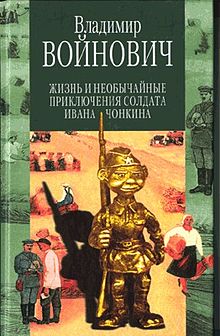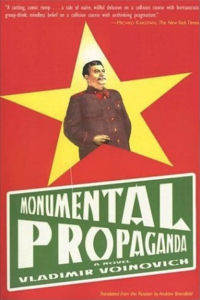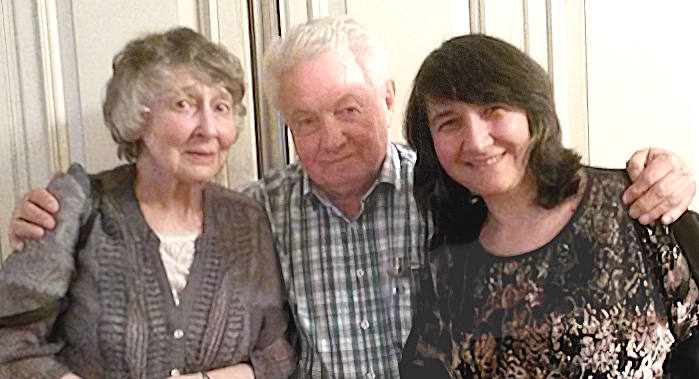Books
At a Time Like This, the West Could Use Its Own Vladimir Voinovich
Voinovich’s legacy has a personal aspect for me.

Two years ago, the world lost a great Russian novelist and essayist whose eye for the surreal would have made him a perfect witness to the current moment—and whose satires had a way of turning prophetic. Even when Vladimir Voinovich’s fiction took a fantastic turn—most notably, in his futuristic 1987 novel, Moscow 2042—his writing remained rooted in the realities of Soviet and then post-Soviet Russia. In 2020 America, his work takes on a new relevance.
Voinovich was just two months short of his 86th birthday when he died of a heart attack in Moscow on July 27th, 2018. It’s a ripe old age, especially in a country where the average male life expectancy is 65. And yet his death still feels untimely. While his star dimmed in his twilight years, his mental and creative faculties did not. His final novel, The Crimson Pelican, published in 2016 (and still awaiting its day in English), is a work of superb wit and imagination.

Voinovich’s legacy has a personal aspect for me. I first fell in love with his best-known novel, The Life and Extraordinary Adventures of Private Ivan Chonkin, a tragicomic tale of a bumbling World War II recruit, when I was a teenager in the Soviet Union. This was the 1970s, when the book was banned, and so I read a foreign-published edition lent to my parents by a trusted friend. Its sequel, Pretender to the Throne, was one of the first things I read in the West after my family emigrated in 1980 (the same year Voinovich himself was forced to leave the USSR). In subsequent years, I saw Voinovich at several readings and book signings in New York. In 2015, I interviewed him for the Daily Beast on one of his trips to the United States (by this time, he once again had made Moscow his home). It turned out Voinovich and his wife were staying with her relatives a five-minute drive from my home. My invitation to a small dinner party led to a friendship that was cut short all too soon.
* * *
Over the course of his long life, Voinovich witnessed several drastic political shifts in his country: the end of Stalinism under Nikita Khrushchev’s thaw; a new chill under Leonid Brezhnev; Mikhail Gorbachev’s glasnost and perestroika; the August 1991 coup by communist hardliners, followed by the collapse of the USSR; and then, after a quasi-liberal interlude marred by chaos and economic devastation, a new authoritarian regime led by an ex-KGB officer named Vladimir Putin—whose rise to power Voinovich arguably predicted in Moscow 2042 (but more on that later).
Many of these turbulent events shaped Voinovich’s life, starting with his father’s 1936 arrest amid Stalin’s Great Terror, when he was just four years old. (Nikolai Voinovich, a journalist, was one of the lucky ones: After five years in a gulag, he was released to fight the Germans, and survived, albeit with disabling wounds.) The younger Voinovich’s literary career began, after army service and construction work, during Khrushchev’s post-Stalinist thaw, at a time when writing that painted Soviet life in a harsh light became publishable (as long as one didn’t criticize the Communist Party itself, or its Marxist-Leninist ideology). Fortune favored him: In 1960, as a junior staffer at Moscow’s state radio station, he wrote lyrics for a song about space flight, ‘14 Minutes to Liftoff.’ It became a huge hit and an unofficial anthem of the Soviet space program, thanks to Khrushchev quoting it while greeting cosmonauts on Red Square in 1962.
But the good fortune did not last long. The liberal climate ebbed, even before Khrushchev’s ouster. By the end of the 1960s, Voinovich’s short stories about characters who struggled to maintain their decency amidst brutality, degradation, and cynicism were denounced as subversive. Plans to serialize Chonkin—which skewered not only Stalinism but the Soviet mythology surrounding the “Great Patriotic War”—in the prestigious Moscow literary journal Novy Mir (which had earlier published Alexander Solzhenitsyn’s One Day in the Life of Ivan Denisovich and other risqué fare) were scuttled.
The novel began to circulate through samizdat, however, and was excerpted in a Russian émigré magazine in 1969 (which helped expose Voinovich to a wider audience, but hardly served to endear him to Soviet authorities). He also spoke out in defense of persecuted writers and other dissidents. While Voinovich still managed to get a collection of short stories published in Moscow in 1972, by 1974 he was officially expelled from the Writers’ Union. He was subjected to relentless KGB harassment, leading to a bizarre 1975 incident in which Voinovich was apparently slipped a cigarette laced with poison, and was ill for several days.
In 1980, another “chat” with KGB officials took an equally drastic turn: Voinovich was warned that “the patience of the Soviet government and the people has run out.” One of his visitors said that he’d had been asked to convey a message: “If you do not alter your present situation, your life here will become completely unbearable.” It was a thinly veiled invitation to emigrate, which Voinovich accepted. Since this played out on the occasion of a Soviet “election”—i.e., a ritual vote-casting for one-party Communist rule—and his visitors had initially posed as volunteer canvassers, Voinovich caustically noted in his memoirs that he was the only Soviet citizen offered an actual choice that day.
By the time he arrived in Germany with his wife Irina Braude and seven-year-old daughter Olga, Voinovich was already internationally famous. The Life and Extraordinary Adventures of Private Ivan Chonkin, in particular, had been published in several translations and hailed as a modern classic. (By now, it has been translated into 30-plus languages.) In 1981, the Politburo stripped him of his Soviet citizenship. He responded, in an open letter, by predicting that the “junk decree” would soon be repealed, and that his books would be widely read in Russia. Thanks to Gorbachev, the prediction came true in less than a decade.
In 1989, an abridged version of Chonkin was serialized in the popular magazine Ogonyok, and Voinovich visited Moscow, drawing huge crowds. His citizenship was restored the next year, and by the late 1990s he was dividing his time between Munich and Moscow. In 2000, he received the State Prize of the Russian Federation for his novel Monumental Propaganda, the tale of a fanatical Stalinist so devoted to the memory of the dead leader that she rescues her town’s Stalin monument after its removal and installs it in her apartment.

But then the wheel of political fortune turned again, and in less than a decade Voinovich was once again a dissident. By then, he’d settled in Moscow permanently, after the loss of his beloved Irina to cancer in 2004 and his eventual remarriage to businesswoman Svetlana Kolesnichenko. Despite the rise of authoritarianism under Putin, the new Russia was still no Soviet Union. Even as a critic of the government, Voinovich was able to live in peace and comfort as, in his sardonic words, a “persona half grata.” He published more books, including the final installment in the Chonkin trilogy in 2007, after a 27-year hiatus. He gave talks and readings, and occasionally even got interviewed on state television—though a documentary commissioned for his 80th birthday in 2012 was nixed and ended up airing on a small independent cable channel.
The final year of his life was marred by tragedy and ill health: In March 2018, Voinovich suffered a heart attack shortly after learning that his son from a short-lived first marriage, writer Pavel Voinovich, had died at age 55. Yet he refused to slow down: After recovering, he went on a book tour in Israel and campaigned for the release of Oleg Sentsov, a Ukrainian journalist and filmmaker who’d been imprisoned in Russia on phony charges of terrorism after being seized in occupied Crimea. (Sentsov was eventually returned to Ukraine in a prisoner exchange last September.)
In his final interview on the independent radio station Ekho Moskvy (“Moscow Echo”) exactly two weeks before his death, Voinovich was in fine form, his wit as dry and sharp as ever. Asked about the future, he said that in the long term, he was an optimist: “Russia took a step toward democracy in 1991. It will do so again.”
* * *
Voinovich’s work is extremely Russia- and Soviet-specific. The Chonkin novels, in particular, are a rich canvas of life under Stalin, its absurd themes ringing true despite the author’s occasional flights of surrealism. A provincial Communist functionary accidentally smacks a Stalin bust on the head in the heat of an argument with another official, and both men freeze in horror: One has committed a possibly gulag-worthy act, while the other doesn’t know if it’s more dangerous to report it or to fail to report. A collective farm chairman gets in trouble for defying Party instructions to harvest the crops, despite heavy rain, to meet the state plan, but is saved when his two accusers are themselves arrested as “wreckers.” A small-town newspaper editor scans the lead article every day to make sure Stalin’s name is mentioned exactly 12 times—but cowers in constant fear after missing a typo that inadvertently casts insult on the leader. A milkmaid who becomes a celebrity “hero of labor” by squeezing all four teats at once to increase milk production gets so busy leading a movement of shock-worker milkmaids that “there was no one left to actually milk the cows.”
Yet despite the novels being rooted in the Soviet experience, and the huge differences in historical context, when I re-read them a few years ago I found an uncanny thematic congruence with the current iteration of social-justice cultism on college campuses and the Internet.
One powerful scene from Pretender to the Throne leaped out at me in particular: a committee hearing on the case of a rank-and-file Communist Party member accused of misconduct—what was known in the Soviet Union as a “personal case.” In a pithy aside, Voinovich defines such cases as “a large group of humans ganging up, in the course of intraspecific conflict, for the purpose of exterminating a fellow creature—on a stupid whim, or out of malice, or for no reason at all.” Sound familiar?

The victim in the Voinovich novel is Shevchuk, a middle-aged schoolteacher facing expulsion from Party ranks for making “a politically ignorant remark” and failing to show proper contrition when first confronted about it (or, as we would say, called out). Shevchuk’s actual offense: blurting out a colloquial expression of shock and dismay after learning of the German invasion of the USSR in June 1941. Shevchuk’s attempts to explain his harmless intent get him nowhere. “You meant to say that our country entered the war unprepared, you wanted to cast aspersion on the wise policies of our Party and disparage the personal merits of Comrade Stalin,” thunders a committee member in response. Another takes the floor but dissolves into hysterical sputtering about his young son, whom he accuses Shevchuk of trying to murder. None of these people believe a word they say, but no one wants to be suspected of sympathy for the wrongdoer.
When the hapless schoolteacher finally decides to admit that he “committed a shameful act unworthy of a Communist” in a moment of weakness, it’s not enough: He is bullied into agreeing that his remark was “slanderous and objectively directed against the Party.” The hysteria escalates, with demands for a full investigation of the “unwholesome atmosphere” at the school where Shevchuk worked. For now, he is ordered to surrender his Party card—but collapses and dies of a heart attack before he can do so.
Obviously, parallels to “woke mobs” and “cancel culture” in today’s Western democracies only go so far: The fact that Shevchuk has every reason to fear not only dismissal from his job but imprisonment as an “enemy of the people” is not a minor detail. And yet the echoes are unmistakable: the canned ideological jargon and performative hysterics, the fact that the victim is not an actual dissenter but a loyalist whose petty verbal transgression is blown out of all proportion, the presentation of inhuman acts of torment as virtuous. “Our humanism is of the militant and activist kind,” declares one character. “It is not expressed in mawkish sentiment and universal forgiveness, but in a ruthless war on all manifestations of hostile ideas.”
I found the scene so strikingly relevant that I decided to translate it into English (since, for various reasons, I found the available English translation wanting), and posted it as a commentary on current events. This led to a brief creative collaboration with Voinovich. A few days after I sent him a link, he wrote to ask if I would be interested in translating his next novel, The Crimson Pelican.
Voinovich obviously hated ideological coercion and cruelty, which certainly would have put him on the other side of “cancel culture.” But, to my knowledge, he never specifically discussed “political correctness” in the West, mostly because it simply wasn’t on his radar. He generally didn’t like to comment on things happening in countries where he didn’t live and which he didn’t know well. (For the same reason, he mostly avoided commenting on Donald Trump: Asked about “the current American president” in his final radio appearance, he would say only that Trump seemed “a bit over the top for a president, especially of a large country.”) I suspect he was also put off by the Kremlin propagandists who used the topic of political correctness to whatabout state censorship in Russia; and by populists (found in abundance in Russia, though also in the West these days) who equate all opposition to overt bigotry with mere PC hectoring.
Voinovich would have had little patience for the communist apologetics of today’s Western left. In Chonkin, he strongly suggests the equivalence of Communism and Nazism. This is underscored in a sequence in which a captain in the NKVD—the KGB’s predecessor—thinks he has been captured by Germans, and tries to explain that he works for the “Russisch Gestapo”; later, realizing he’s among Soviet soldiers, he tries to prove his loyalty by hailing Stalin, but gets so confused that he instead seals his doom by shouting out, “Long live Comrade Hitler!”
But Voinovich also detested rightist ideologies. Moscow 2042, published during his years of exile, scandalized the émigré community with its scathing satirical portrait of Slavophile writer and visionary Sim Karnavalov, a character based transparently on Solzhenitsyn. Voinovich had once admired Solzhenitsyn for his J’accuse against the Soviet state, but was repelled by his religious nationalism and pretensions to prophet status.
“It’s amazing how many people can’t imagine a life without leaning on some sort of ideology,” Voinovich told me during our last interview, in January 2017. “Most people, at least people reared by the Soviet regime, can’t understand that a human being can matter simply as a human being. I once asked my daughter when she was still quite young, ‘Olya, how do you see yourself—as a Russian, a German? What do you think you are?’ and she replied, ‘I’m Olya, and that’s enough.’ Each person should be able to say, ‘I’m so-and-so, and that’s enough.’ But no, most feel the need to be a part of something big.” Voinovich was referring to the embrace of Russian Orthodoxy in post-Soviet Russia, but it’s equally true of identity politics in the modern West (proof that you don’t need to be reared by the Soviet regime to seek the comfort of groupthink).
Like others who grew up in a dictatorship that denied civil liberties to its citizens, Voinovich had a healthy regard for the liberal political values that many in the West have come to take for granted (or even disparage). When I asked him about the similarities between Trump and Putin during our last interview, he dismissed the equation as too crude. But he did point out something in Trump’s inaugural address that hadn’t caught my attention: the assertion that the United States is protected by its military, by law enforcement, and by God, with no mention of liberal institutions. “I would still say,” Voinovich ventured, “that America is protected not only by the military and by God, but by its constitution and its political system—the checks and balances.”
* * *
In Moscow 2042, first published in 1987, the narrator travels into 21st-century Russia, which he finds to be a regime based on a merger of the Soviet state and a bastardized Russian Orthodox Church (with KGB agents doubling as priests). Not only does this have uncanny parallels to the current Kremlin regime, but the supreme leader of this future state—a cult figure known as “The Genialissimo”—is a onetime KGB officer who spent a good part of his career stationed in Germany, just like Putin. Monumental Propaganda, first published in March 2000, when Putin was still acting president after Boris Yeltsin’s retirement, also ends on what seems to be a prophetic note: As the narrator drives past the empty pedestal where the Stalin monument once stood, he thinks he can see a shadowy figure of a man forming on it in the mist.
Voinovich laughed off the suggestion that he had special powers of prophecy, pointing out, for instance, that his portrayal of the merger of a KGB-run Soviet state with Russian Orthodoxy was based on actual trends in the 1970s and early 1980s: the increasing influence of the secret police, and the knowledge that some members of the Soviet elite felt Marxism-Leninism was a bankrupt ideology that needed to be replaced with something more spiritually appealing. As for that shadowy figure at the end of Monumental Propaganda, Voinovich told me in our 2015 interview that he was indeed “thinking of someone like Putin,” but also pointed out that he didn’t get it quite right: He’d imagined the future autocratic leader to be indifferent to material things. (Putin’s net worth is believed to be something on the order of $200 billion.)

At a New Jersey event for a mostly Russian émigré audience, I heard Voinovich quip, “Next time, I’ll write a utopia. People keep saying that all the bad things I write come true, so I’m going to write something good.” Instead, what he wrote was The Crimson Pelican, a novel in which the surreal and fantastic elements of some of his earlier works (including the Chonkin novels, the last of which has a subplot built around the idea that Stalin was the offspring of an unnatural coupling between man and mare) are raised to a new level. The narrator—another Voinovich alter-ego, elderly writer Petr Smorodin—finds himself on a long ambulance ride from his suburban home to a Moscow clinic after being bitten by a possibly infected tick.
The tick bite and the ambulance trip, Voinovich told me, really happened, and gave him the idea for the novel, in which the ride turns into an endless surreal journey that blends reality, dreams, and hallucinations. (“It occurred to me that our reality is so absurd that the only way to describe it is an absurdist literary genre,” he explained—a comment that was meant to apply to Russia, but feels true in today’s United States.) There are bizarre detours, monstrous traffic jams, and strange hitchhikers. There’s a US State Department van that recruits dissidents, in a sarcastic nod to Kremlin propaganda. There’s also a meeting with Putin—or rather, a Putin surrogate known as the Supreme Executive, or Suprex (the Russian title is Perligos, an equally ridiculous abbreviation for “head of state”). In Voinovich’s fantasy, Putin’s notorious 2012 airplane flight guiding a flock of cranes turns into a mission to save a breed of rare endangered pelicans: Suprex undertakes to hatch their eggs by sitting on them bare-bottomed. It all ends with Smorodin being offered Suprex’s job, with fittingly fantastic results. He finally wakes up as the ambulance arrives at the Moscow clinic, only to realize that his adventure was a dream. Or maybe not.
The Crimson Pelican is anything but a utopia, but one of its elements did come true in the saddest way possible: When Voinovich suffered his final heart attack, the ambulance called to his country house got lost on the way and arrived too late.
* * *
The next-to-last time I saw Voinovich—in the first hours of 2017, when he invited my mother and me to a New Year’s Eve dinner with Svetlana and a few friends during one of his other visits to New Jersey—he gave me a copy of The Crimson Pelican. It contained an inscription expressing his hope that, with my help, “this bird will finally start cooing in English, too.” Alas, efforts to find a publisher proved unsuccessful, apparently because the book was seen as not very marketable. (Translated excerpts from the novel are posted online.) One of my major regrets is that I let my email correspondence with Voinovich lapse because I kept waiting until I could bring him good news about the translation; while he was a remarkably humble man who never carried himself as a literary idol, he was clearly chagrined by the fact that interest in his work had waned in the West. (Monumental Propaganda was the last Voinovich book to be widely reviewed; the English-language publication of the third Chonkin novel, A Displaced Person, went virtually unnoticed in 2012.)
Assuming that some residual level of cultural sanity can be sustained in the years to come, I am still hoping for a Voinovich rediscovery, including the English-language publication of The Crimson Pelican and of Voinovich’s still-untranslated memoir, A Self-Portrait—as well as a new translation of the first two Chonkin novels, which deserve to take their place as 20th-century classics.
Voinovich’s work has a rare combination of cutting intelligence and profound humanity. While brilliant satire can be cold and aloof—think Voltaire’s Candide, or Joseph Heller’s Catch-22, to which Chonkin has sometimes been compared—Voinovich’s warm affection for his characters never wavers. This is especially true of Ivan Chonkin, the good-natured, simple-minded soldier whose very simplicity sometimes helps him see the absurdity of Soviet propaganda; but it’s true even of the generally odious anti-heroine of Monumental Propaganda, Aglaya, a Communist zealot who is also a broken and lonely woman.
A deep sense of caring coupled with an eye for the absurd, especially ideological absurdity: these are sorely needed qualities in our own time. Certainly, an English-speaking Voinovich would find ample fodder in the many real-world Aglayas who delight in exterminating their fellow creatures, “on a stupid whim, or out of malice, or for no reason at all.”






